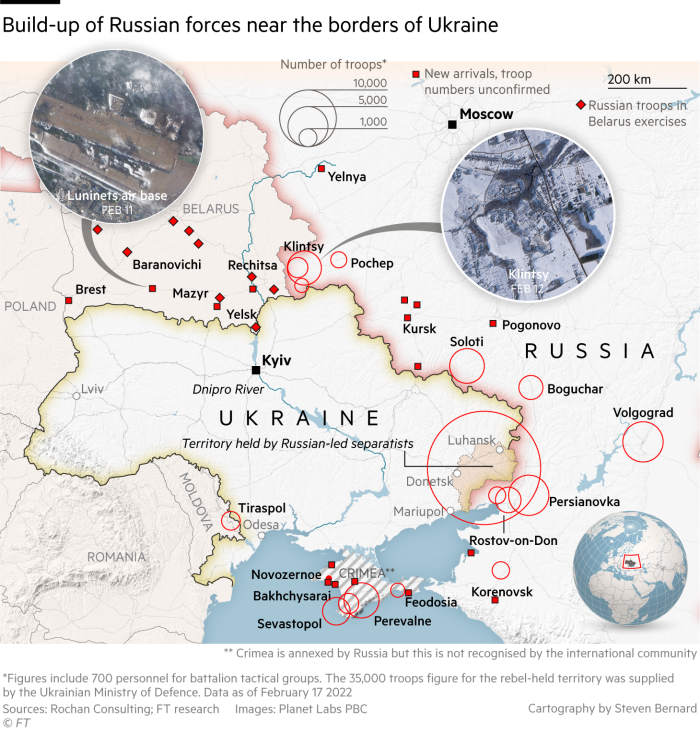Vladimir Putin and Joe Biden have accepted “the principle” of a summit to ease tensions over Ukraine, the White House and French presidency said, capping a series of increasingly urgent diplomatic efforts led by Emmanuel Macron to defuse the crisis.
The possibility of a meeting between the Russian and US presidents follows days of rising fears that Moscow will launch a full invasion of Ukraine. These concerns were heightened over the weekend when Belarus said 30,000 Russian troops participating in joint drills would stay in the country indefinitely.
The Kremlin said on Monday that there were “no concrete plans” for such a meeting, but did not rule out the option. “It is too early to speak of any concrete plans to arrange some sort of summit,” said Kremlin spokesman Dmitry Peskov. But he added: “A meeting is possible if the heads of state decide it is useful.”
Instead, he pointed to a potential meeting between Antony Blinken, the US secretary of state, and Sergei Lavrov, Russian foreign minister. “We understand that this week a meeting of Lavrov and his US counterpart is possible. Also, we do not exclude the possibility of ministers of France and Russia,” Peskov said. Putin is due to address a session of Russia’s security council on Monday.
Moscow has massed as many as 190,000 troops on Ukraine’s borders, including those participating in the Belarus drills, despite previously pledging they would return to base.
Macron spoke to Russia’s leader in two lengthy phone calls on Sunday, in what a French official described as “part of the last possible and necessary efforts to avoid a major conflict”. He also spoke separately with Biden.
After those conversations, the French presidency said Macron had proposed a “summit to be held between President Biden and President Putin and then with relevant stakeholders to discuss security and strategic stability in Europe”.
It added that the substance would be prepared during a meeting between Blinken and Lavrov set for Thursday.
The summit could “only be held at the condition that Russia does not invade Ukraine”, according to the statement from the Elysée. A French official said the French statement on the summit was seen by both Moscow and Washington before it was published.
The White House said: “President Biden accepted in principle a meeting with President Putin following that engagement [between Lavrov and Blinken], again, if an invasion hasn’t happened.”
A Biden administration official separately told the Financial Times that the format and timing of a possible Biden-Putin summit remained “to be determined” and it was “all completely notional”.
France said Putin had also agreed to a trilateral meeting on Monday between Russia, Ukraine and the Organization for Security and Co-operation in Europe to enforce the ceasefire on the 500km “contact line” in eastern Ukraine.
The conflict between Russia-backed separatists and government forces in the Donbas region in eastern Ukraine has escalated in recent days. The separatists have accused Ukrainian troops of breaching the ceasefire and ordered an evacuation of civilians, a move Kyiv and its western allies said could be a pretext for a Russian invasion. Kyiv has reported heavy shelling on its positions on the frontline.

The Kremlin earlier said Putin “recognised the importance” of finding a diplomatic solution to the crisis “through the foreign ministries and political advisers of the Normandy format countries”, a reference to Russia, Ukraine, Germany and France.
“It falls upon these contacts to ensure the ceasefire is restored and progress in regulating the Donbas conflict is made,” it said, without confirming any specific agreement on more talks.
Putin blamed clashes in eastern Ukraine on “provocations by Ukrainian security forces”, as Washington accused Moscow of creating false pretexts for an attack.
Belarus’s defence minister Viktor Khrenin said on Sunday that Putin and Alexander Lukashenko, the president of Belarus, made the decision to extend the drills for an unspecified period because of “increasing military activity on [the countries’] eastern borders and the worsening situation in the Donbas”.
Blinken said Washington believed Putin had decided to invade Ukraine, but that diplomacy was still an option. Emphasising the US president’s willingness to talk to Russia’s leader, Blinken told CBS: “Even if the die is cast, until it’s settled, until we know that the tanks are rolling, the planes are flying and the aggression has fully begun, we’re going to do everything we can to prevent it.”
He added: “But we’re prepared either way, and we’re prepared with a response that will have massive consequences for Russia if it actually carries this through.”
The US embassy in Moscow warned Americans in Russia on Sunday to prepare evacuation plans.
Peskov told state television that “tensions have been ramped up to the maximum [on] the contact line” in the Donbas. “Any spark, any unplanned event or minor provocation could lead to irreversible consequences,” he said.
But Peskov said western claims that Russia was planning an imminent invasion were “provocative” and “could have disastrous results”. He repeated Putin’s denials that Russia would attack Ukraine.
“Russia, which has lived through so many wars, is the last country in Europe that wants to so much as say the word ‘war’ aloud,” he said.
Additional reporting by Jasmine Cameron-Chileshe in London
Biden and Putin agree ‘in principle’ to summit on Ukraine
Pinoy Variant